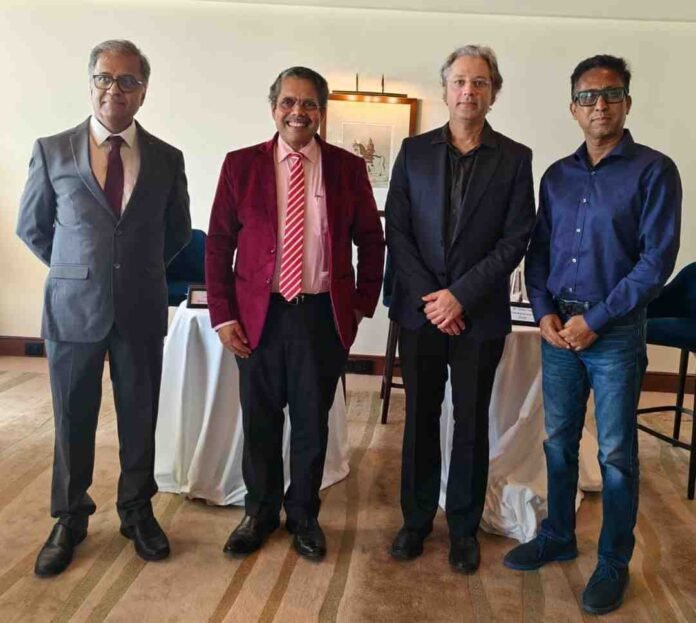Mumbai: The Partnership to Fight Chronic Disease (PFCD) convened a panel of leading orthopaedic surgeons in Mumbai – Dr. Mudit Khanna, Consultant Joint Replacement Surgeon, Wockhardt Hospital, Dr. Milind Patil, Orthopaedic Surgeon, Revival Bone & Joint Hospital, and Prof. Dr. Pradeep B. Bhosale, Principal Director – Robotic Joint Replacement, Hip and Knee Surgery, Nanavati Max Hospital to discuss India’s growing arthritis burden and the urgent need for equitable insurance coverage for robotic joint replacement.
Arthritis affects nearly 60 million Indians, yet fewer than 10% undergo joint replacement surgery. Despite the availability of advanced robotic technology – now an established global standard of care – millions continue to live with chronic pain and disability. India faces a critical challenge – a high disease burden, delayed treatment, and limited access to advanced interventions. The panel emphasized that insurance gaps, not medical limitations, remain the biggest barrier preventing patients from accessing life-changing care.
Robotic-assisted joint replacement offers surgical precision, faster recovery, and improved long-term outcomes. CT-based planning allows surgeons to tailor the procedure to each patient’s unique anatomy, anticipate anatomical challenges in advance, reduce human surgical errors, preserve healthy tissue, leading to better joint function and long-term outcomes. It is particularly valuable for patients with complex joint issues such as severe degeneration and deformities. Yet, limited insurance coverage often prevents patients from accessing robotic procedures, creating financial barriers that affect treatment decisions.
The Insurance Regulatory and Development Authority of India (IRDAI) took a key step in 2019 by directing insurers to include modern treatments in their offerings. Yet, coverage for robotic-assisted procedures continues to vary across plans, which may influence how patients evaluate their treatment options and affordability. Financial barriers such as sub-limits or caps on claims can prevent patients from choosing robotic surgery despite its proven clinical benefits.
Dr. Milind Patil said, “Robotic joint replacement is no longer experimental – it is an established technology with over 20 years of clinical use, adopted across 45 countries, with over 1.5 million procedures performed globally. In 2025, in Australia, about 41% primary knee replacement surgeries were Robotic. Projections indicate that by 2030, nearly 70% of such procedures in the U.S. will be robotic. Yet I’ve seen families, are forced to delay their surgeries while waiting for insurance to fully support the procedure, affecting life decisions and overall family well-being.”
Dr. Mudit Khanna said, “Patients choosing robotic joint replacement for its precision and faster recovery should not be denied their rightful insurance support. If they are willing to bear the extra cost themselves, insurance companies must still cover the standard amount applicable to a conventional joint replacement. No patient should be penalized for wanting access to safer, more advanced care. Patients shouldn’t have to choose between ‘better care’ and ‘insurance support’. Everyone deserves the right to access the best possible treatment without being penalized for it.”
The panel underscored that insurers must recognize the long-term value of robotics – fewer revision surgeries, reduced readmissions, faster recovery, and quicker return to productivity. While upfront costs may appear higher, the technology leads to greater savings for patients, insurers, and the healthcare system.
Prof. Dr. Pradeep B. Bhosale said, “Insurers need to look beyond the immediate cost of surgery and appreciate the long‑term advantages of robotic procedures. Comprehensive coverage not only benefits patients but also helps insurers by reducing downstream healthcare costs and ensuring fair access to world‑class care. Revision surgeries – depending on failure patterns – can cost two to six times as much as primary surgeries; with robotics, implantation is more precise, which helps prevent failures and delivers long‑term savings.”
Aman Gupta, Asia Representative, PFCD underlined the patient-centric mission: “At PFCD, our focus is ensuring no patient is left behind due to financial constraints. We advocate for insurance policies that recognize robotic joint replacement as a medically necessary, value-driven innovation, enabling equitable access to world-class care and improving quality of life for arthritis patients.”
PFCD continues to champion equitable access for chronic diseases like Arthritis for patients across India with Stryker as the awareness partner. Every individual should have equitable access to advanced medical care like robotic joint replacement, which not only improves patient outcomes but also strengthens the healthcare ecosystem as a whole.


